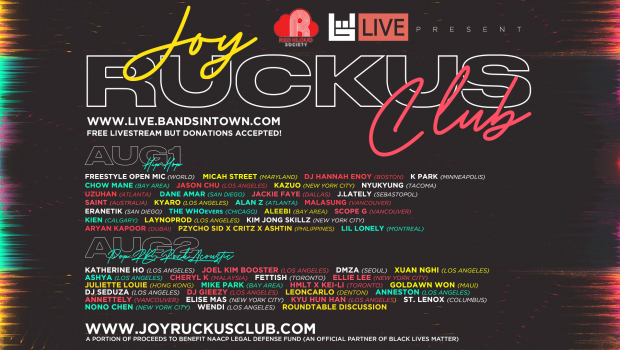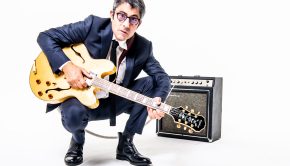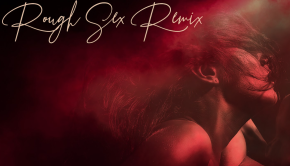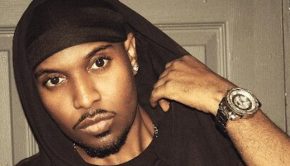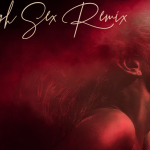Interview: Kublai Kwon, A Pioneer In The Asian-American Music Scene Talks Bandsintown Partnership and The Future of Joy Ruckus Club
Kublai Kwon, a pioneer in the Asian-American music scene is the founder of Koreatown-based label Red Kloud Society, the executive director of the Asian Hip-Hop Summit and now the founder of the popular Joy Ruckus Club, a streaming festival led by and celebrating young Asian American artists. Throughout his 30 plus years in the music industry, Kwon has been a longtime advocate for advancing diversity and inclusion. It is no wonder then that his popular Joy Ruckus Club has teamed up with Bandsintown to bring the festival to the largest collection of music fans in the world on Bandsintown LIVE August 1 and 2, 2020, going from 7pm-3am ET/4pm-12am PT on Saturday August 1, and 5pm-1:30am ET/2pm-10:30pm PT on Sunday August 2. This event will not only break new talent but push the culture forward through a curated lineup of specifically progressive-minded Asian American artists who wanted to perform in support of the Black Lives Matter movement.
To discuss this event and the state of Asian-American music, Fast FWD sat down (virtually) with Kublai Kwon to talk about his rise in the music business, his journey in founding Red Kloud Society, and why Bandsintown and Joy Ruckus Club’s partnership will be a moment music fans won’t want to miss.
You are considered a pioneer in the Asian American music scene. Can you give our readers some background on your rise in the music business and how you were able to really build Asian American artists?
I dropped out of the Ph.D. in English Literature program at the Univ of Southern CA at the age of 23 after realizing that the true poets in America were not the stiff-lipped writers of stuffy “modern” poetry that no one reads but the rappers in the music industry. And through the rappers, poetry in America was great and more popular than ever–racism might deny this fact though. Shortly thereafter I threw my first hip hop concert with primarily Asian American artists. With the largest Asian population in America, Los Angeles should be the center of a thriving Asian American culture but at that time there was barely any activity at all, just a few spoken word events with Filipino artists. Certainly nothing within the greater pan-Asian community. So I saw the need, and I organized accordingly. Over the years, I got really good at throwing shows and eventually organizing concert tours, so then the non-Asian sectors of hip hop demanded my services, and eventually I kind of left the Asian American organizing behind to focus on general music industry endeavors, but since Corona, I’ve seen the opportunity and the need again to organize within the Asian American community but in the virtual space primarily. Asian Americans (not Asians from Asia, or Kpop) are still completely shut out of the mainstream of music in this country so clearly the battle has not been won.
One of your biggest accomplishments has been your founding of the Red Kloud Society label. Can you give us background on how you got that started and how the business has changed over the years?
I’ve always been interested in all aspects of music business, so once my concert promotions and tour booking company was established, I started to get curious about recording business, and I wanted to learn everything about it and master it so that I could be a fully rounded out music man. Also, recording business is fun, to develop artists and help in the creation of music is extremely satisfying. So 5 years ago, I opened my first studio in Burbank, which launched the Red Kloud Society label, and have cycled through dozens of vocalists and producers since then, primarily focusing on artist development, and my own personal development as a recording business executive. I suppose you could say the label, now based in Koreatown L.A., has a strong Asian American flavor to it but we are not exclusively working only with Asian musicians. Our ambitions are not humble. We are aiming for #1 songs and #1 albums at Red Kloud Society.
You are also one of the founders of the Asian Hip-Hop Summit. What has this conference meant to the Asian-American community and the music industry more broadly?
Asian Hip Hop Summit started in 2001 in Koreatown, L.A. as a benefit show on the anniversary of the Los Angeles Riots. It was intended to give a voice to what was then a mostly invisible and voiceless community. We were also supposed to be representing the more progressive side of politics, as opposed to the general stereotype of Asians being conservative. We were the first festival since the original Asian American movement of the 1960s and 70s to feature a pan-Asian American lineup of artists. Over the years of throwing this annual festival, and overseeing its growth to become eventually a nationwide touring festival, we planted the seed for the fully national Asian American cultural scene. We became the platform and inspiration for countless Asian American artists, many of whom have gone on to success and fame.
Now you are partnering with Bandsintown to bring the Joy Ruckus Club, an Asian-American music fest in support of BLM, to their live streaming audience. Can you give the readers some background on the festival and how the Bandsintown deal came to be?
With live shows and tours shut down, I put my concert promoter hat back on, but in respect to the realm of the virtual. I saw that during May, which is Asian American month, several factions of Asian American artists had thrown virtual events. Now for me, having festivals and concerts in the Asian American community, this is not only our birthright, but its absolutely necessary for the health and sanity of the community. It kind of upset me that these factions were basically only bothering to organize their events because the US government had designated one month when Asian American culture can happen. To me, its not about having Asian American events in May, its really more about having them outside of May, in June or December, every month if possible, not just the assigned time when the government is allowed to throw us breadcrumbs of culture. So that kind of inspired me to come up with Joy Ruckus Club and throw the event with the mindset that we can have these types of events regardless of whether its Asian American month or not. And whats great about this event is that most of the artists performing are young and relatively new but super talented and also the team I have working with me on throwing the event are also young Asian Americans with extreme talent in music business, and thats what this culture has to be all about, an Asian American culture for the youth and not just a celebration of the same old names. This young energy is what is being unleashed with Joy Ruckus Club, and all respect to the Asians from Asia who have made a name in America such as the Kpop acts but this young energy from the Asian Americans is what will renew and nourish Asian America, not the foreign energy. Also, it was very important that we do this event in solidarity with Black Lives Matter, to represent the more progressive side of Asian America and to promote that as the vanguard, in opposition to the conservative factions which unfortunately have dominated within Asian American arts. I pitched the idea of Joy Ruckus Club to Kristin Yasuda at Bandsintown and she loved the idea and we ran with it and never looked back.
After this festival, what other partnerships or activations is Red Kloud Society and Joy Ruckus Club planning that fans can look forward too?
It would be great to throw another Joy Ruckus Club as soon as possible or create new franchises through Joy Ruckus Club for the Asian American community. One day, after Corona passes, perhaps we can gather all these types of artists together and throw a live festival. We will do as much as we can, but the sad reality is that the Asian American community doesn’t really support Asian American arts or artists, so that events like Joy Ruckus Club are essentially nonprofit, and without an investment by the community of resources and money, how can culture like this continue? It can’t, and it will be Asian America’s loss. So hopefully, Joy Ruckus Club can inspire the next generation of Asian Americans to get more involved and help support these types of cultural movements which are good for us and necessary.

